Ideas
‘Aakhri Boond’ Is An Admirable Campaign, But It Is Time To Factor In Consumerism
Sahana Singh
Jan 06, 2020, 07:29 PM | Updated 07:29 PM IST
Save & read from anywhere!
Bookmark stories for easy access on any device or the Swarajya app.
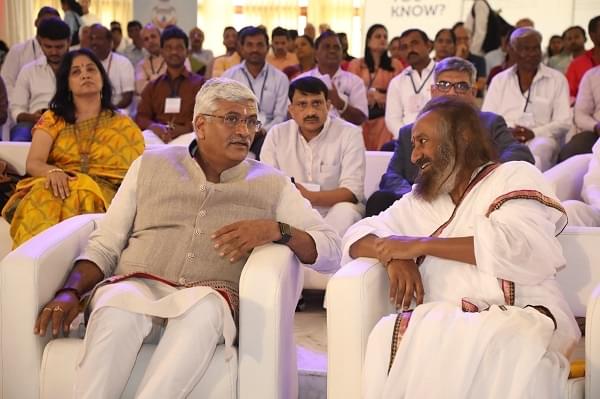
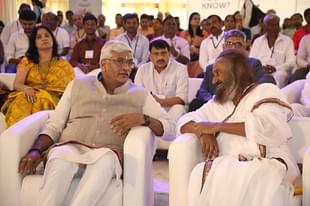
In mid-December, I was invited to be a part of the launch of the “Aakhri Boond” campaign at the Art of Living International Centre in Bengaluru (see a video of the entire proceedings below).
The iTV Network has launched the admirable campaign to “sensitize and educate people across the country about conservation of water”.
Supported by companies such as Kent RO and Ministry of Jal Shakti, Department of Water Resources, River Development and Ganga Rejuvenation, the campaign has launched a series of activities and programmes and galvanized the print and digital media.
In the past 19 years that I served as Editor of Asian Water Magazine (www.asianwater.com.my/emagazine), I got the chance to travel extensively and study the issues of water and wastewater management.
I have often wished for spiritual leaders to take up the pressing matters of water conservation and ecological harmony.
Without behavioural changes in order to align Indians with their civilizational ethos, there is little chance of bringing about real change. In India, spiritual leaders such as Sri Sri Ravi Shankar, Sadhguru, Shri Satya Sai Baba and others are highly respected and have a mass following, which gives them enormous leverage in terms of bringing about behavioural change.
Thus, in the past decade, it was with satisfaction that I saw a rise in the number of spiritual leaders getting involved in river rejuvenation, rainwater harvesting and other environmental projects.
At the launch of the Aakhri Boond campaign, Sri Sri Ravishankar made an impassioned plea to save India’s rivers and wells which were being sucked dry as well as polluted with garbage.
He pointed out that non-native trees like acacia and babul, which had been planted mindlessly near rivers and water bodies, had led to a lowering of the water table.
“We need to carry out deforestation of non-native water-guzzling species and then carry out afforestation of native, indigenous species,” he said.
Sri Sri reminded that it was the Dharmic duty of everyone to plant at least five sacred trees in a lifetime such as banyan, neem, mango and peepal.
Planting such trees would help to recharge groundwater. He also made reference to the practice of offering flowers, fruits, sarees and bangles to rivers such as Kaveri, which are regarded as mothers.
He was of the opinion that it was good to symbolically offer flowers and fruits but when it came to sarees, it was better to give it to needy women.
He also said it made ecological sense to use Ganapati and other moortis made of clay or mud during puja and refrain from using painted murtis which could cause toxicity in rivers during visarjan.
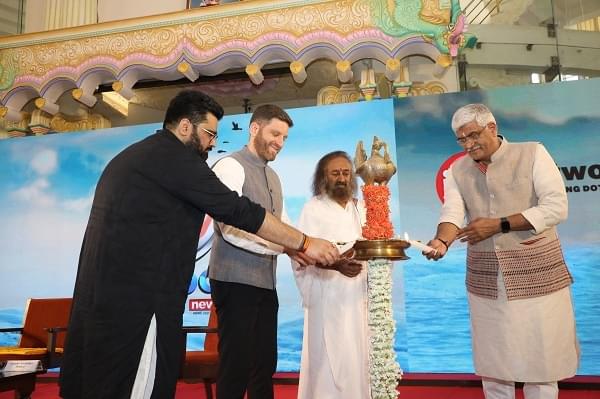
Shri Gajendra Singh Shekhawat, the Minister of Jal Shakti, who was the chief guest at the Aakshri Boond campaign in Bengaluru, recalled the words of his grandmother in the context of the acute water crisis in India despite being the land of monsoon and rivers.
“Ever since water began flowing from taps in our homes, we have stopped respecting it,” he quoted.
“As long as we had to all collect water from rivers and wells, we took the utmost care to not overuse or pollute,” he said.
Shri Shekhawat pointed out that under the leadership of Shri Narendra Modi, political will and public spending had been geared towards water management like never before.
Over one crore rainwater harvesting structures were being refurbished or rebuilt completely with the help of public participation.
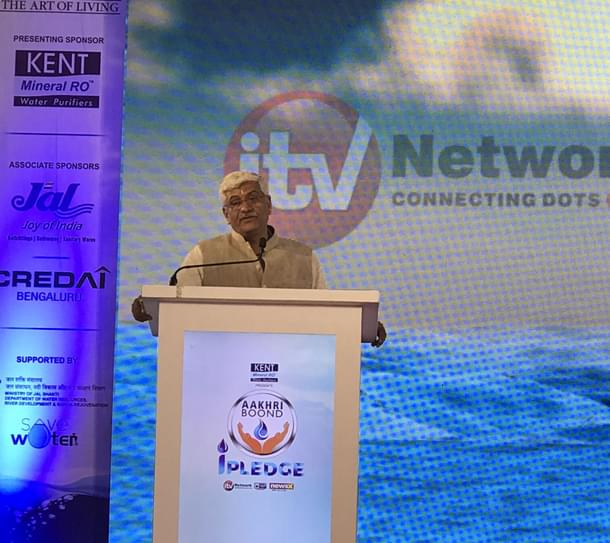
Israel was clearly the flavour of the day with innumerable references being made to the country’s huge advances in drip irrigation and water recycling.
Ariel Seidman, Deputy Consul General at Consulate General of Israel in Bengaluru was present to speak about his country’s water contributions.
I remembered the words of an Israeli expert I met in 2011 who said that by 2015, his country would not depend any more on rainfall.
That statement had sounded rather presumptuous to me. But during my travels in Israel, I saw purple pipelines carrying reclaimed wastewater all over the countryside along with new seawater desalination plants coming up to complement the existing capacity.
Today, the country is recycling almost 95 per cent of its wastewater.
Several water champions were awarded at the event such as Salumarada Thimakka, Dr Ayyappa Masagi, Khema Ram, the Art of Living River Rejuvenation Team, Jagadesh and Anand Malligavad.
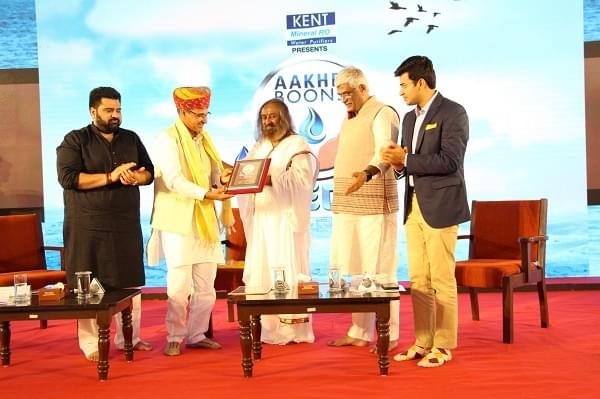
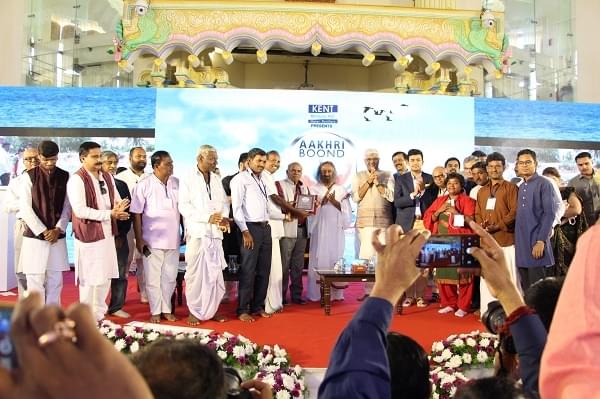
I was delighted to find myself seated next to the 108-year-old Thimakka.
She responded with innocent joy when I held her hands and told her how much I admired her work of planting hundreds of trees.
She touched my head and blessed me exactly as she had blessed the President of India when she received her Padma Shri award earlier this year.
In true Sanatani style, she went on to bless my entire kutumbh!
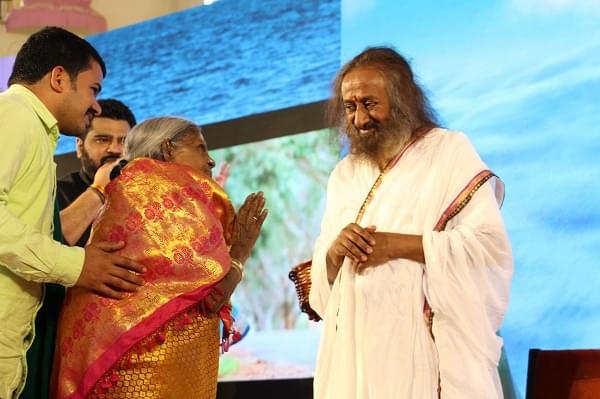

The Aakhri Boond campaign launch event was steered excellently by the iTV moderators.
The audience was able to watch live the happenings at various sites where AOL has been actively restoring rivers and water bodies.
It was heartwarming to see the people who have been working hard at the grassroots level to restore ecologies.
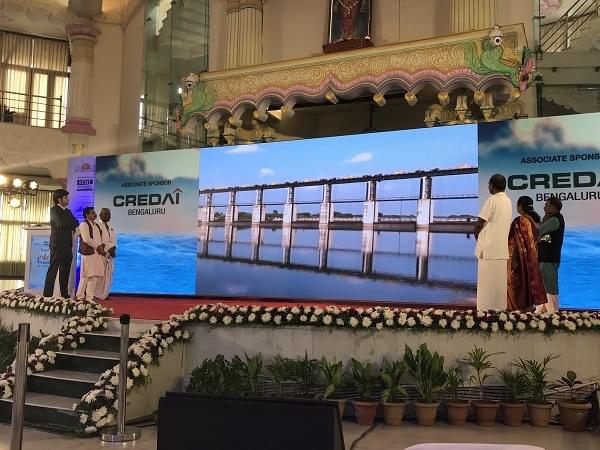
Soon, it was time for the panel discussion that I was invited for. The topic was “Water wars and the future of cities” and apart from me, the panelists included Tejasvi Surya (Member of Parliament), Joseph Hoover (Environmental Activist), S Vishwanath (Water conservationist), Dr Lingaraj (National Director, River Rejuvenation Project, Art of Living) and Harshika Poonacha (Actor).
All the panelists made important points. Shri Tejasvi spoke about the excessive corruption and political interference in the water sector that needed to be stopped. Shri Hoover spoke about the need to immediately stop the deforestation of the Western Ghats and to put honest, incorruptible people in important portfolios such as the head of pollution control authorities.
Shri Lingaraj stressed on urban watershed management starting from households and resident welfare associations.
Harshika spoke about how she took care to use less water in her household. Shri Vishwanath said that each of the three — samaaj (civil society), sarkaar (government) and bazaar (markets) had to play its part for water to be managed well.
He pointed out that in Bengaluru, the samaaj was doing a good job with so many groups formed to protect lakes.
However, when it came to sarkaar, he said it was imperative to re-imagine water governance.
Water being a state subject, it is possible for states to take initiative and be more innovative.
“The groundwater authority has just six members when there are 400,000 borewells in this city,” said Shri Vishwanath.
He also wondered why the regulatory agencies were not able to stop the pollution of lakes in the city.
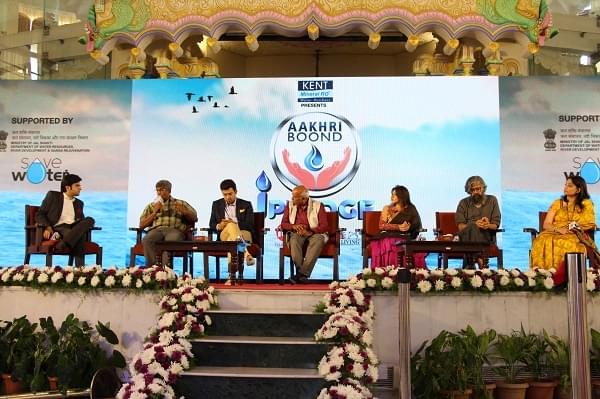
However, it struck me that almost no one spoke about the elephant in the room — lifestyles and mindless consumerism.
Many delegates spoke about the need to turn off taps, to use less water but almost no one brought out the importance of the “water footprint” of every product we use in our daily lives.
Everything we use or buy is linked to water consumption. In the panel discussion, I made the point that the more one consumes, the more one shops for items which have come out of a factory, the more water one is using (and polluting because used water goes back to nature often without adequate treatment).
Handbags, clothes, shoes, mobile phones, paper, coffee, tea — none of these along with their inevitable packaging can be produced without millions of gallons of water.
Globally, there is little awareness about the fact that the more factory-produced milk one drinks or the higher up the food chain one eats, the more water one consumes.
Factory-produced meat requires millions of gallons of water to irrigate the farms producing grains used to feed livestock.
It might not seem obvious but even when one uses electricity, one uses humongous amounts of water because power cannot be produced without water.
A vegan who uses expensive leather handbags, shoes, phones, eats chocolates and in general, is a big consumer has a bigger water footprint than the occasional fish or meat eater who recycles her clothes or buys second-hand goods and does not drink tea or coffee.
Certain plant products like rice/groundnuts/olives require a large amount of water to be produced and thus our food choices determine how much water remains in lakes and wells.
The Aakhri Boond campaign is a commendable one. This is the first time I am seeing a media channel taking up the issue of water scarcity with such seriousness.
At the launch programme, I met many amazing individuals who are working in their towns and villages to reduce water pollution and to plant trees.
However, the campaign would be of far greater value if it specifically includes the aspect of reducing mindless consumerism.
The pledge which is being administered by the campaign focuses on reducing water usage and protecting freshwater sources but it needs to be broadened to include the reduction of eco-unfriendly consumerism.
The Art of Living Foundation headed by Sri Sri has walked its talk by restoring 42 rivers and freshwater bodies.
What would have been a multi-crore-rupee project has been carried out at a fraction of its cost because AOL has ensured the participation of civil society.
What remains now is for spiritualism, self-awareness and mindfulness — all loose terms for becoming more connected with Dharma — to become more widespread and lead to adoption of simpler lifestyles.
As Dr Pankaj Jain explains in his book Dharma and Ecology of Hindu Communities,” nature or environment were not seen as an external entity by rural Hindu communities such as the Bishnois, Bhils and Swadhyaya.
It was a part of us and, therefore, protecting it was as much a part of Dharma as protecting ourselves.
Global denizens must drink deep from the Indic understanding of the interconnectedness of the universe, of the Earth as a mother, of Karma which determines consequences of our actions and, therefore, our future.
Sahana Singh is an engineer, author, editor and commentator who specializes in water/sanitation issues and Indic history. Her articles have been published in Reader’s Digest, Washington Post, Straits Times, Discovery Channel Asia and other publications. Ms Singh is an avid traveler who likes to connect the dots across societies, civilizations and disciplines.





